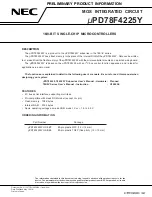
4 – 38
Remote Operation
progress),
UNSTABLE 2
(tuning failed due to initial instability),
SUCCESS 3
(tuning succeeded),
FAILED 4
(tuning failed to converge),
or
CHECK POLARITY 5
(tuning failed due to wrong TEC wiring polar-
ity). All query responses
other than
ON 1
indicate the tuning system
is idle.
Front panel:
%%
&'#
.
TUNE?
Example:
SUCCESS
TEC Autotune Step Size
TATS(?)
{
f
}
Set (query) the temperature control autotune step size
{
to
f
}
, in A.
The default curret step used by the
TUNE
command is 10% of
TILM
.
This step size can be modified with the
TATS
command, up to a
maximum of 25% of
TILM
.
Increasing
TATS
may improve autotuning for noisy setups. Decreas-
ing
TATS
will reduce the temperature excursion during autotun-
ing, which can improve recovery time after tuning, as well as yield
slightly improved temperature control.
Front panel:
%%
%"/ )*
.
TATS 0.100
Example:
TEC Control Loop
P
Gain
TPGN(?)
{
f
}
Set (query) the temperature control loop proportional gain
{
to
f
}
, in
A
/
◦
C (or A
/
k
Ω
).
The temperature control loop of the LDC500 implements a classical
PID
control law, given by:
Output
=
P
×
+
I
dt
+
D
d
dt
where
=
(
T
set
−
T
meas
) or
=
(
R
set
−
R
meas
). “Output” is the TEC
current, in amps. The
TPGN
command sets
P
in the equation. Note
that for a properly connected TEC,
P
<
0 whenever the control is in
Celsius, or if the sensor has a positive temperature coe
ffi
cient (for
resistance mode).
TPGN
is set automatically following a successful autotune cycle.
LDC500 Series Laser Diode Controllers
















































